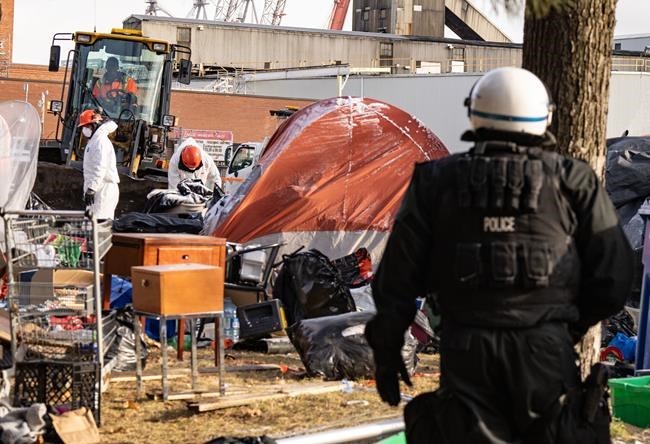
Police look on as workers from the Ministry of Transport dismantle a homeless encampment in Montreal, Monday, Dec. 2, 2024. THE CANADIAN PRESS/Christinne Muschi
Republished February 18, 2025 - 12:26 PM
Original Publication Date February 18, 2025 - 1:01 AM
MONTREAL - There is no magic solution to homelessness, Montreal's public consultation office heard Monday as it began a series of hearings on how the city can more successfully integrate services for vulnerable people into neighbourhoods.
Montreal announced the public consultations last year, as city officials grappled with the complex realities of rising numbers of people experiencing homelessness, and public opposition toward services such as shelters and supervised injection sites.
On Monday, the consultation committee heard from the first group of more than 50 people and organizations registered to speak, including from those who have experienced homelessness and had poignant stories to tell. However, it also heard testimony from witnesses to crime, drug use, disruptive behaviours and even death in areas that became gathering places for homeless people.
"These is no magic or universal solution to issues of homelessness or social cohabitation," said Jeanne Archambault, who spoke on behalf of Action Autonomie, a group that defends the rights of people who use mental health services. "Just as medication isn't the only response to mental health, housing isn't the only solution to homelessness."
At the hearings in a community centre in the Village district, she said authorities should work directly with homeless populations to create "diversified and long-lasting" solutions, including resources that are adapted to couples, people with pets, people who are intoxicated and those whose behaviour might be considered disruptive.
Archambault and her colleague, Diane Dupuis, were two of several presenters who spoke out against increasing the presence of police or security guards around places such as homeless shelters. Police and security guards, they said, make some unhoused people feel unsafe and contribute to the mistaken belief that they're dangerous.
Dupuis noted the public needs to learn to show openness.
"We're aware that poverty disturbs people, and nobody likes to see its effects, even though we rub shoulders with it every day in public spaces," she said, noting that the issues of mental health and homelessness can mean people exhibit behaviours that make those around them feel uncomfortable "without necessarily being dangerous."
Several people shared experiences with homelessness, including a woman who described losing her job and then her apartment and finally, at age 50, ending up in a shelter with only a backpack. "I had lost everything," said Chantal Rail. "Everything I worked so hard for, for so many years, ended up at the city pound and was destroyed. Photos, clothes, books, personal papers … all gone."
Rail, who now helps to educate others on female homelessness, said her story proves that not everyone who is homeless struggles with drugs and alcohol, and that anyone can become homeless.
A dance teacher and former homeowner, Julie Rivest, described falling behind on mortgage payments after a serious of misfortunes including her partner's death and an employer who paid her late. Eventually, she lost the home and also a car on which she had only four payments left. She suggested there needs to be more help available for people who are struggling, so they don't become homeless in the first place.
"It's like I'm obligated to be totally finished, in bad mental health before I can get help," said Rivest, adding that she has struggled to access benefits because of her self-employed status.
The consultation also heard from two people representing residents of the city’s Chinatown neighbourhood, who described issues of crime, drug use and disorder that they tied to the opening of an emergency homeless shelter. Last year, residents also discovered the body of a woman who had died, they said.
One speaker, Phil Chu, said he recently decided to move his family out of the city. "At one point, you don't know what to say to your children," he said. "My daughter is six years old now, and someone injecting themselves at the street corner, someone defecating outside your door … and it's not something that happened once in a while, it was almost every day."
Glenn Castanheira, the head of an association representing downtown businesses, said commerces have always served as unofficial shelters, first responders and food banks, and were often happy to help. However, he said, the rising number of unhoused people with increasingly complex conditions has created an "intolerable" situation, resulting in physical and verbal abuse of workers and lost business.
"Downtown has always had homelessness in its backyard, but we feel like the backyard is full, or at least starting to overflow," he said.
Both Castanheira and the Chinatown residents noted that the effects of homelessness are disproportionately borne by their downtown neighbourhoods, and called for resources such as shelters and supportive housing to be more equally distributed around the city.
Yvan Michaud, of the Chinatown residents group, said no new homeless resource should open without formal consultations with surrounding residents; although upon questioning by the commissioners, he noted that there was a strong possibility that residents would not grant approval if consultations were held.
On Tuesday, officials with Montreal's public transit authority told the commission the city's subway stations can no longer act as an "overflow shelter" for people who have fallen through the cracks of the social safety network and have nowhere else to go.
Société de transport de Montréal executive director Marie-Claude Léonard said at least five people died of suspected overdoses in the city's subway stations last year, and personnel have already administered the overdose-reversing drug naloxone 16 times since the beginning of this year.
This report by The Canadian Press was first published Feb. 18, 2025.
News from © The Canadian Press, 2025